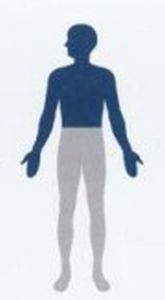

MedFriendly®


Abirritation
Abirritation is a term that is no longer used much in the field of
medicine that means a decrease or end of irritability in a part. It is
sometimes used to refer to an abnormal condition in which there is a
lack of irritation, such as when a body part is weakened, numb, and
not easily stimulated. An example of a condition causing abirritation
would be paraplegia, which is the loss of the ability to move and/or
feel both legs and generally, the lower trunk (stomach area and lower
back). This is shown in the picture to the right in which the gray area
refers to the region of sensation loss. Abirritation is sometimes used
to refer to decreased reflexes in a body part.
FEATURED BOOK: Neurology for the Non-Neurologist
A related word, abirritate means to make less irritable and to soothe, such as one would
do by rocking a baby to sleep who is crying and upset. An abirritant is the substance
used to produce decreased irritation and soothing.
An example would be an abirritant cream prescribed by a skin doctor to reduce itching.
Another example would be a gel applied to the gums and/or teeth prescribed by a dentist
to reduce irritation.
Abirritation comes from the Latin word "ab" meaning "from," and the Greek word "irratus"
meaning "to irritate." Put the words together and you get "from irritate."
"Where Medical Information is Easy to Understand"™
















